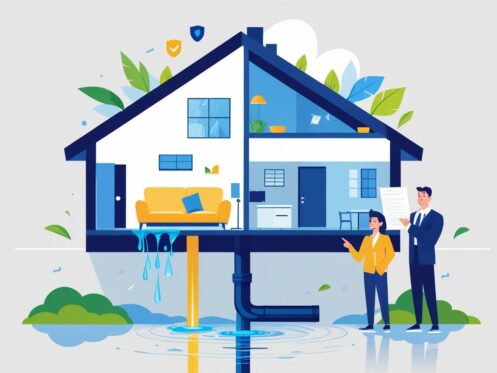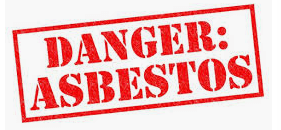Homeowners insurance will usually cover the water damage caused by burst pipes, but it often does not cover the cost to repair or replace the pipes themselves. Whether your insurance pays depends largely on the cause of the burst, such as sudden freezing or accidental damage, rather than wear and tear or neglect.
If you experience a burst pipe, acting quickly can limit further damage and insurance complications. Understanding your policy’s specifics can save you from unexpected expenses. If you need professional repairs or advice, Splash Plumbing near Anaheim, CA, offers reliable service to address plumbing emergencies and help you get back on track.
When Does Insurance Cover Burst Pipes?
Your home insurance policy typically covers damage caused by burst pipes only under specific conditions. Coverage mainly applies when the damage is sudden and accidental, not when it results from gradual issues or neglect. Understanding these distinctions can help you manage expectations when filing a claim.
Sudden and Accidental Damage
Homeowners insurance generally covers water damage caused by a burst pipe if the incident happens suddenly and unexpectedly. For example, if a pipe bursts due to an unforeseen event like freezing temperatures that cause it to crack, the resulting water damage will usually be covered.
However, your insurance policy often excludes coverage for the broken pipe itself—you’ll be reimbursed for the damage caused, but not the pipe repair or replacement. This distinction is common in most home insurance policies and is important to keep in mind when dealing with repair costs.
If the pipe burst occurs because of a sudden accident without prior warning or neglect, your insurance company is more likely to provide coverage for the resulting repairs or cleanup. More details are available on Investopedia’s explanation of broken pipe coverage.
Exclusions for Wear and Tear
One key limitation in home insurance policies is the exclusion of damage caused by wear and tear or long-term maintenance issues. If your burst pipe is the result of chronic corrosion, rust, or poor upkeep, your insurer may deny coverage.
Insurance is designed to cover unexpected accidents, not damage stemming from neglect or lack of maintenance. If pipes are old and gradually degrade, the burden to repair or replace them typically falls on you, not your home insurance policy.
Coverage denial often occurs when the insurance company determines the damage was preventable through regular inspection or maintenance. For help assessing your plumbing system’s condition to prevent such issues, consider consulting professionals like Splash Plumbing, especially if you live near Anaheim, CA.
Requirements for Preventative Measures
Many insurance companies expect homeowners to take reasonable measures to prevent burst pipes, especially during cold weather. For instance, if you leave your home unheated in freezing conditions and pipes freeze and burst, your home insurance may refuse your claim.
To maintain coverage, you should:
- Keep the home heated consistently
- Insulate exposed pipes
- Shut off and drain water lines during extended absences in winter
Failing to meet these basic precautions can void your coverage for burst pipe damage. Insurers look for proof that you acted responsibly to avoid avoidable damage. For property owners concerned about pipe maintenance and repairs, trusted services like Splash Plumbing offer expert advice and prompt repairs that can protect your insurance coverage.
Additional details about these preventative expectations can be found at Travelers’ home insurance burst pipe advice.
Types of Coverage for Water Damage from Burst Pipes
When a burst pipe causes water damage, different parts of your homeowners insurance may come into play. Coverage can include repairs to your home’s structure, replacing or repairing your belongings, and costs related to living elsewhere while your home is being restored.
Dwelling Coverage Explained
Dwelling coverage pays for damage to the physical structure of your home caused by sudden water damage from burst pipes. This includes walls, floors, ceilings, and built-in appliances affected by the water. It often does not cover the pipe itself if it broke due to wear and tear or lack of maintenance.
This coverage usually reimburses you based on either the replacement cost or actual cash value, depending on your policy. Replacement cost covers full repair or replacement without depreciation, while actual cash value deducts for age and wear.
If a burst pipe leads to mold or ongoing leaks, some policies may exclude those costs unless you took proper preventative measures. Working with a reliable plumber—like Splash Plumbing—can help reduce risk and ensure repairs meet insurance requirements.
Personal Property Coverage
Personal property coverage, often called Coverage C, protects the belongings inside your home damaged by water from a burst pipe. This includes furniture, clothing, electronics, and other personal items affected by water.
Coverage typically compensates for the actual cash value of damaged items, meaning depreciation is taken into account. To get replacement cost coverage on your belongings, you may need to choose this option and possibly pay a higher premium.
Documenting your possessions with photos and receipts can help support your claim. Keep in mind some valuables may have special limits or require additional endorsements on your policy.
Loss of Use and Additional Living Expenses
If your home becomes uninhabitable due to water damage from a burst pipe, loss of use coverage (Coverage D) can help cover living expenses. This may include hotel bills, meals, and other costs you incur while your home is being repaired.
Your policy usually limits this coverage to a percentage of your dwelling coverage amount or a fixed dollar limit. It’s important to save receipts for all extra expenses during this period.
Understanding this part of your insurance enables you to manage relocation costs without unexpected financial strain if your home needs extensive repairs.
For water damage repairs or emergency plumbing needs after a burst pipe, you can rely on local experts such as Splash Plumbing near Anaheim, CA, to provide prompt and thorough service.
Common Causes of Burst Pipes and Insurance Implications
Burst pipes most often happen due to factors like freezing, age, or pressure. Your insurance coverage depends on the cause and whether the damage resulted from sudden events or neglect.
Frozen Pipes and Coverage Considerations
When pipes freeze, they expand and can burst, leading to water damage. Insurers typically cover sudden bursts caused by freezing if you took reasonable steps to prevent it, like keeping your home heated.
However, damage due to neglect—such as not insulating pipes in cold weather—may be excluded. You must document efforts to maintain your plumbing to support an insurance claim.
Splash Plumbing can help ensure your pipes are properly insulated to minimize risk during cold spells. Prompt repairs and winterizing your plumbing system can protect your home and strengthen your coverage position.
Aging Pipes and Maintenance
Pipes degrade over time due to wear and tear. Insurance rarely covers damage from gradual deterioration or failure to repair aging pipes.
If a burst results from long-term neglect, your claim will likely be denied. Replacement and regular maintenance are critical to avoiding this issue.
Keep records of repairs and pipe replacements. This documentation proves you upheld your responsibility to maintain your home and may help if a sudden burst occurs.
Excessive Pressure and Accidental Events
High water pressure or sudden accidents can cause pipes to burst unexpectedly. Insurance often covers bursts caused by these sudden, accidental events.
Pressure-related bursts can happen from faulty pressure regulators or blockages. Installing pressure regulators can help prevent pipe stress.
If an accident causes a burst—such as a contractor damaging a pipe—you generally have coverage for resulting water damage and repairs. Always report incidents quickly to support your insurance claim.
For reliable repairs and advice on preventing future bursts, Splash Plumbing near Anaheim, CA, offers expert services tailored to your home’s needs.
What Isn’t Covered by Homeowners Insurance
Insurance policies have clear boundaries when it comes to water damage from burst pipes. Knowing what events and conditions are excluded helps you avoid unexpected expenses and plan better for repair costs.
Excluded Water Events
Homeowners insurance usually does not cover water damage from floods caused by natural disasters like heavy rain or river overflow. Flood damage requires a separate flood insurance policy, which you must purchase independently.
If your pipe bursts due to wear and tear or gradual deterioration, your insurer will likely deny your claim. This is considered a maintenance issue rather than a sudden accident. For example, corrosion or rust that causes slow leaks won’t be covered. You must handle these repairs yourself or risk being underinsured.
Burst pipes caused by negligence or lack of maintenance are not insured risks. Keep your system in good shape to avoid costly out-of-pocket payments.
Negligence and Policy Denials
Insurance companies can deny claims if they determine the damage resulted from homeowner negligence. This includes ignoring signs of plumbing issues or failing to winterize pipes in cold weather, especially if pipes freeze and burst.
If you delayed repairs or ignored routine inspections, your insurance policy may exclude your claim based on negligence.
Sometimes, insurance policies contain specific clauses excluding damage when proper upkeep isn’t performed. You should review your policy carefully to understand exclusions.
The Limits of Pipe Repair Coverage
Most homeowners insurance policies cover water damage caused by burst pipes but do not pay for the repair or replacement of the broken pipes themselves. Coverage typically focuses on repairing affected walls, floors, and damaged belongings.
Replacing pipes after a failure is usually your responsibility, unless you have an endorsement or rider that includes plumbing system repair. These add-ons are rare and can increase the cost of your premium.
Understanding this limitation can guide you when working with a trusted plumbing service like Splash Plumbing near Anaheim, CA. They can assist you in identifying the cause and handling repairs efficiently.
How to File a Burst Pipe Insurance Claim
Filing a claim for a burst pipe involves detailed steps to ensure your water damage is properly documented and your insurance company processes it smoothly. You need to act quickly to minimize damage, communicate clearly with your insurer, and make necessary repairs without delay.
Immediate Steps After a Pipe Bursts
As soon as you detect a burst pipe, turn off the main water supply to stop further flooding. This prevents additional water damage to your home and may be required by your home insurance policy to keep your claim valid.
Next, assess the extent of the water damage without disturbing the scene too much. Avoid trying to repair the pipe yourself before speaking with a professional plumber to ensure repairs are done correctly and comply with insurance guidelines.
Contact a licensed plumber like Splash Plumbing to handle repairs promptly. Immediate action can reduce claim disputes and lower overall home repairs costs.
Documentation and Communication
Document the damage thoroughly before cleanup or repairs. Take clear photos and videos of the burst pipe, surrounding water damage, soaked floors, walls, and any affected personal property.
File a claim with your insurance company as soon as possible. Provide detailed information including when the pipe burst, how much damage occurred, and any relevant photos or videos. Keep copies of all correspondence and claim forms to track progress.
Be honest and specific when describing the situation. Clarify if the pipe burst due to freezing, wear and tear, or another cause, as some policies exclude certain types of damage.
Emergency Repairs and Adjuster Visits
If your home requires immediate attention to avoid further damage, perform emergency repairs like shutting off water or extracting standing water. Keep receipts for emergency services; insurers often reimburse these expenses when supported by proper documentation.
After you file the claim, your insurance company will assign an adjuster to inspect the damage. Ensure you are present during the visit to point out all affected areas and provide your photographic evidence.
Coordinate repairs with your plumber only after the adjuster’s inspection or with insurer approval to avoid any coverage issues. Splash Plumbing can assist in making timely and thorough repairs aligned with insurance requirements.
Frequently Asked Questions
Burst pipe claims require clear documentation and prompt action to improve your chances of approval. Understanding coverage specifics and how damage occurs can save you from unexpected costs.
What are some tips for filing an insurance claim for a burst pipe?
Immediately stop the water flow to prevent further damage. Take photos and document the damage before making any repairs. Contact your insurance company promptly and keep receipts for any emergency repairs or cleanup.
Are damages from frozen burst pipes typically covered under homeowners insurance?
Damage from frozen pipes is usually covered if you took reasonable steps to prevent freezing. Lack of maintenance or negligence that led to the pipe freezing may void coverage.
Is the repair of broken pipes under a foundation covered by homeowners insurance?
Homeowners insurance often covers damage caused by sudden pipe bursts under a foundation but usually excludes the cost to repair the pipe itself. Check your policy for specific slab or foundation coverage.
Does homeowners insurance generally cover the cost of burst pipes under a slab?
Most standard policies cover resulting water damage but not the repair or replacement of the pipe under the slab. Additional endorsements may be necessary for full slab pipe repair protection.
What’s the average insurance claim amount for damages caused by a burst pipe?
Claims vary widely but often range from several thousand to tens of thousands of dollars depending on the extent of water damage and necessary repairs.
Will homeowners insurance cover the replacement of a main water line?
Typically, damage from sudden events may be covered, but wear and tear, maintenance issues, or gradual deterioration are excluded. You may need a separate policy or endorsement for main line replacement coverage.
If you are in Anaheim, CA, and face pipe problems, Splash Plumbing offers expert repairs and inspections to help minimize damage and support your insurance claim process.












